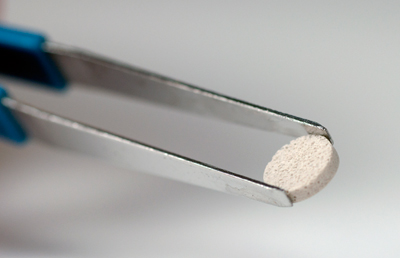News
Harvard bioengineer David Mooney, who will use funding from the Michelson Grant to research a nonsurgical alternative to spaying and neutering dogs and cats, is pictured at home with his two dogs. (Photo courtesy of David Mooney.)
Cambridge, Mass. – January 13, 2015 – The Gary Michelson Found Animals Foundation has awarded Harvard bioengineer David Mooney a three-year grant totaling more than $700,000 to pursue development of a vaccine technology that would provide a nonsurgical method for spaying and neutering dogs and cats.
Mooney is the Robert P. Pinkas Family Professor of Bioengineering at the Harvard School of Engineering and Applied Sciences (SEAS) and a Core Faculty member at the Wyss Institute for Biologically Inspired Engineering at Harvard University.
 Mooney's research team has previously developed an implantable cancer vaccine, pictured here. (Image courtesy of David Mooney.)
Mooney's research team has previously developed an implantable cancer vaccine, pictured here. (Image courtesy of David Mooney.)
Mooney’s team will use the grant award to adapt its existing work in implantable and injectable vaccines that activate the body’s immune system to attack cancer or infectious disease. This time, the team hopes to tune the technology towards targeting and disrupting a hormone crucial to reproduction in mammals.
Gonadotropin-releasing hormone (GnRH), which is produced in the brain, regulates the release of hormones from the pituitary gland that control reproduction in both male and female animals. Mooney and his team will explore how their various vaccine immunotherapies, which work by recruiting and activating the body’s immune cells to attack specific agents, could be used to target GnRH and produce antibodies against it, halting the reproductive process.
“As a pet owner myself, I’m excited to receive this grant award to help develop technology that could provide nonsurgical spay and neutering methods for dogs and cats,” Mooney said. “An accessible and affordable way to sterilize pets would reduce the number of animals in shelters and prevent a vast number of euthanizations.”
Michelson Found Animals is a non-profit animal welfare organization that funds scientists who are developing nonsurgical alternatives for sterilizing dogs and cats through its Michelson Prize and Grants for Reproductive Biology program, which offers the $25-million Michelson Prize to the scientist who can provide the first effective product. Development of such a solution would hugely reduce the number of animals entering shelters. Each year in the United States, millions of tax dollars are spent rounding up between six million and eight million homeless, unwanted pets. Ultimately, half of the dogs and cats that end up in shelters are euthanized.
“Immunotherapy is an emerging area of interest in human health and medicine, but the approach is equally as promising for veterinary medicine,” said Wyss Institute Founding Director Donald Ingber, who is the Judah Folkman Professor of Vascular Biology at Boston Children’s Hospital and Harvard Medical School and a Professor of Bioengineering at Harvard SEAS. “Using a simple and inexpensive vaccination as a way to sterilize animals could greatly reduce the number of animals ending up in shelters and greatly reduce animal suffering.”
Mooney’s team will use already-FDA-approved materials in new and innovative ways to try to develop a safe approach for spaying and neutering dogs and cats using a one-time, permanent contraceptive vaccine.
Topics: Health / Medicine
Cutting-edge science delivered direct to your inbox.
Join the Harvard SEAS mailing list.
Press Contact
Caroline Perry



